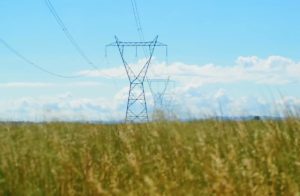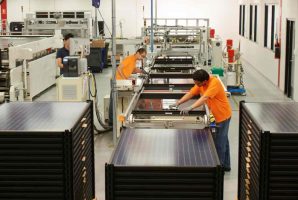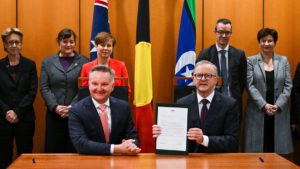A group of almost two dozen federal Labor MPs have been meeting in secret to air their dissatisfaction over the party’s climate policies, adding to pressures on federal leader Anthony Albanese to embrace the coal sector and soften Labor’s emissions reduction targets.
The details of the meetings, of what has been dubbed the “Otis Group” – named after the Canberra restaurant where the group first met, were detailed in a report by Ten News, and in The Australian by reporter Peter van Onselen.
According to the reports, the group consists of around 20 Labor parliamentarians, who are keen to see the party more openly support the coal sector and coal workers. The group includes at least four members of the Labor shadow cabinet and has been motivated by fears that the party may not be able to win back the support of Queensland voters with a platform ambivalent about the future of Australia’s coal sector.
Members of the group denied that the group represented a threat to the leadership of Anthony Albanese, saying that the group was “just a group of Labor people who are interested in supporting coal workers”.
Following the 2019 election loss, the federal Labor party has been undertaking a review of its climate change positions, and it is understood that Labor is considering walking away from its 2030 target of reducing emissions by 45 per cent, and will instead focus on a longer term target of reaching zero net emissions by mid-century.
Labor took what many considered to be an ambitious policy platform to the 2019 election, which included a 50 per cent renewable electricity target, which was described as ‘economy wrecking’ by the Coalition, but which has since been effectively adopted in official government forecasts.
Labor leader Anthony Albanese was quick to downplay the significance of the meeting.
“That’s what happens in Canberra, people go out and people chat about ideas. There is nothing unusual about this,” Albanese said.
“The Labor Party is united in our position that climate change is real, that we need to act on lowering our emissions and good action on climate change means more jobs, lower emissions and lower energy prices.”
None of the senior Labor leadership, which includes Albanese, deputy leader Richard Marles and shadow treasurer Jim Chalmers, were aware of the group or its meetings until the media reports surfaced.
Earlier in the week, Albanese dismissed the prospects of a new coal-fired power station being built in Queensland, labelling the proposal a “unicorn” despite the Morrison government committing $4 million in taxpayer funds to undertake a feasibility study into a project proposed for Collinsville.
However, Albanese was less optimistic about the prospects of climate change legislation being promoted by independent MP Zali Steggall, which would lock in a target of zero net emissions into law, suggesting it was unrealistic to expect that any coalition members would cross the floor of the parliament to support the bill.
That there exists a group within the federal Labor party that wants to see the party tone down messaging about a transition away from the coal sector is not particularly new news.
However, the revelations do raise concerns about the influence of a growingly disaffected pro-coal faction within the federal Labor party, particularly one that includes a substantial number of members of the shadow cabinet and one that is meeting in secret.
The loudest agitator within the Labor caucus for the party to reposition itself as a party that embraces the coal industry has been shadow agriculture and resources minister Joel Fitzgibbon.
Fitzgibbon, who represents the coal-heavy electorate of Hunter in New South Wales, suffered a 9.5 per cent swing against him at the 2019 election.
It was part of a wider push back against the Labor party in areas where the resources sector represents a significant part of the local economy and which saw Labor claim just six of the 30 Queensland seats, and effectively denied the party the chance to form government.
Labor has been forced to toe a difficult line between embracing a strong platform on climate change, and demonstrating its commitment to communities that either dependent on the resources industry for income or see it as a lifeline for struggling communities.
Either direction opens up the Labor party to attacks from the Coalition on one side for being anti-coal workers, and attacks from the Greens on the other for being aligned with the fossil fuel industry.
Joining the group was the shadow tourism minister Don Farrell, who has been a long-time power broker within the South Australian branch of the Labor Party. Other shadow cabinet members included South Australian MP Amanda Rishworth and Western Australian MP Madeleine King.
The group of 20 or so reported Labor parliamentarians represent around a fifth of the Labor party room and has members from each State and Territory across Australia.
In just the second week of parliamentary sitting for 2020, it is clear that climate change and energy policy remains a highly divisive topic both between and within the major political parties.
The emergence of a pro-coal Labor faction follows a failed attempt to topple Michael McCormack as leader of the National party by that party’s own pro-coal faction.










